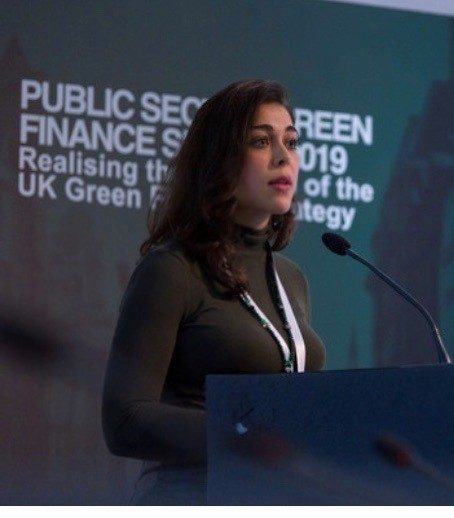– August 26, 2020 –
Kátia Fenyves holds a Master’s degree in Public Policy and Governance from Sciences Po Paris and a Bachelor’s degree in International Relations from the University of São Paulo. Throughout her professional career, she has gained experience in international cooperation for sustainable development in the third sector and philanthropy. She is currently the Green Finance Program Manager of the UK Diplomatic Mission to Brazil.
1. You have studied and worked with the issue of sustainability and the environment. Can you tell us a little about these topics?
The environment is a basic theme. All life on the planet depends on its balance. The economy, in the same way, is only sustained from natural resources and their use. Sustainability, therefore, was the concept that integrated the considerations to the environmental, social, and economic aspects, revealing more systemically this inter-relationship and, above all, placing the environment as a strategic axis of development, beyond its intrinsic value.
2.When we talk about sustainability, we think of the social, environmental, and economic tripod. How would you define these principles? Which one deserves more attention, or are they all interconnected and affect our quality of life in their entirety?
Exactly, sustainability is the concept that reveals the interconnections between the three pillars – social, environmental, and economic and, therefore, are interdependent and insufficient principles if taken individually. Perhaps, the environment is the only one that escapes this. Nature does not depend on the economy or society. On the other hand, it is impacted by both. Therefore, sustainability is an anthropic concept. It is a notion that has as a reference to the human presence on the planet.
3. Are issues related to sustainability, environmental preservation, and conscious consumption discussed at schools and universities?
Among the National Curricular Guidelines established by the National Council of Education, there are specific ones for Environmental Education that must be observed by the education systems and their institutions of Basic Education and Higher Education from the National Policy of Environmental Education. These contemplate all the themes mentioned in the question. I am not an expert in the area, so it is harder to evaluate the implementation, but in terms of the institutional framework, Brazil is well-positioned.
4. When we talk about environmental preservation, we also think about the disposal models that cause so much damage to the environment. Is there any policy to encourage conscious disposal?
Once again, Brazil has a very consistent legal framework to encourage the conscious disposal that is the National Policy on Solid Waste of 2010, which is even an international reference. More than an incentive, it is a disincentive to unconscious disposal through the establishment of shared responsibility for the life cycle of products and reverse logistics. It means that the PNRS forces companies to accept the return of their discarded products, in addition to holding them responsible for their environmentally appropriate destination. The innovation lies mainly in the inclusion of waste pickers and recyclable and reusable materials in both reverse logistics and selective collection, something essential for a country with our social context.
5. Do you think current disposal models will replace new models in the post-pandemic era? For example, how to encourage people to discard antivirus masks consciously?
It is always necessary to think it over. The pandemic has highlighted weaknesses in the implementation of the PNRS. Most Brazilian hospitals do not effectively separate and give an appropriate destination for their waste. With Covid-19, the problem grows both by a large amount of health services waste generated and by a large number of generators since the population also starts to produce waste on a large scale. There is still a lot of information missing, so maybe this is the first step: an awareness campaign that will throw light on this issue.
6. In your opinion, is the world more aware of the need to preserve the environment and natural resources so that future generations can enjoy them?
I believe that we have passed the point where these preservation needs were a matter of conscience and have reached a level of survival. It’s not just about future generations. We are already suffering the consequences of the environmental imbalance caused by human action and the depletion of natural resources right now. The pandemic itself is the result of dangerous relationships between human beings. And the environment and conflicts over water sources, for example, are a reality.
7. What are the actions that cause the most harm and degrade the environment?
Our production and consumption model as a whole is on a predatory relationship with the environment: we remove more than needed, without respecting natural replacement cycles. And when we dispose of the waste, we do not comply with the appropriate standards established. We already have enough knowledge to avoid most of the problems, but we still can’t integrate it into our practices effectively and definitely.
8.In your opinion, what should be done for societies to know more about sustainability, environmental preservation, and conscious consumption?
I believe that society to advance needs to address the issue of socioeconomic inequalities that are intrinsically related to environmental differences, including those of information and knowledge. Education is, therefore, a strategic component for this advance. It is necessary to have a broad understanding that also brings traditional know-how into this equation. Besides, it is fundamental to address the topic from the perspective of opportunities since the transition to more sustainable ways of life, which preserve the environment and are based on conscious consumption, leverage countless of them; for example, a higher potential for generating quality jobs and less spending on health.
9. Is the climate issue related to sustainability? How is it related to sustainability?
The climate change intensified by anthropogenic action is related to our production and consumption patterns in unbalancing with the environment: on the one hand, we have been emitting a very significant amount of greenhouse gases and, on the other hand, we have been degrading ecosystems that absorb these gases, diminishing the planet’s natural capacity to balance emissions. Thus, the climate issue is related to an unsustainable way of life. The good news is that sustainable practices directly generate a positive impact on the planet’s climate balance. For example, Brazil has the potential to produce more than 25 thousand gigawatts of solar energy using its excellent geographical location with plenty of sunlight. It is a sustainable measure and, at the same time, one of the best alternatives for reducing CO2 emissions in the atmosphere, which is one of the intensifier gases of the greenhouse effect.
 English
English Português
Português

